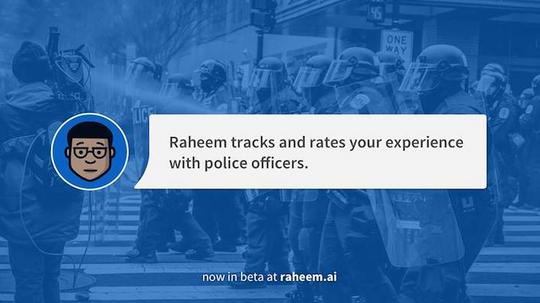
It was the summer of 2014 when the idea for Raheem came to Brandon Anderson.
No one was charged for the death of Eric Garner in 2014. Anderson's own life partner was killed in a confrontation with police in 2007, and he started to think of more ways to make his voice heard.
"This is a personal issue for me, as much as it is a professional one," Anderson said in an interview.
Anderson was serving overseas as a satellite engineer in the U.S. Army at the time, and when he started digging into what had happened, he realized that the police officer involved had several complaints lodged against him — all of which can be easily missed when an officer transfers from city to city.
Certainly, Anderson thought, there are others who are coping with the loss of a loved one. Certainly, there are others who've experienced racism in a police encounter. Certainly, there was a better solution than just writing think pieces or joining an advocacy group.
"That's just not the route I took for healing. I wanted to get out, and I wanted to do something about it," Anderson said.
Enter Raheem.
Raheem is a Facebook Messenger chatbot designed to listen to anyone and everyone's experience with the police. Anderson said the team behind Raheem consulted with a psychologist, a copy writer and his own individual experiences to make sure the chatbot responds to a user's stories with as much empathy as possible.
In the fall, Anderson will start at the Halcyon Incubator in Georgetown as a way of fleshing out the second part of Raheem: the dashboard. Currently in development, each dashboard will offer anonymous and aggregated data for law enforcement officials and community organizations that would benefit from the data collected from these conversations.
"I had realized that we weren't doing enough, and I also realized that what we had been doing — especially what people in my friend groups and family were doing — were talking about police," Anderson said. "We had been talking about police to our friends, we had been talking about police to our family members. When we get stopped by a police officer, we write about it on Facebook."
"Regardless of how the interaction went, we were talking about it. But there was no real way to collect that data."
So far, Raheem has been going through beta testing of about 1,000 members to make sure everything is up to speed before they make a push to partner with police departments. Anderson says him and the team of 12 that make up the startup are in talks with the Mayor of Stockton, California and the Ottawa Police Services in Ontario, Canada so far.
He also said they've partnered with local and community organizations to help inform their political practices and approach potential partnerships.
"Raheem provides a free, safe and anonymous way for people to talk about their experience with police," Anderson said.
Raheem started in 2014 when Anderson was in college at Georgetown University. At the time, the platform was called SWAT and it was aimed at creating a more human experience that would live inside apps people use today, such as Facebook Messenger.
That's a big reason why Anderson thought of Facebook Messenger as the best platform for Raheem. It's difficult to get anyone to download an new app for an event that they can't plan for, especially when users are constantly prioritizing which apps they keep on their phones to avoid maxing out their storage.
“The way that people communicate with Raheem is really important to us. We want them to know that they’re talking to a friend."
Before landing on Messenger as their platform of choice, Anderson and the team interviewed about 140 people about the platform — What would work for them? What problems do they have with it? Just basic customer pool interviews, including senators, lawyers and police officials. "I had a good sense of what really needed to be in the reports," Anderson said.
The best option was creating a built-in plugin for an app that everyone uses.
"We found out that one part of our demographic uses Facebook religiously. Sixty percent of Hispanics and Latinos use Facebook to communicate with their families," Anderson said. "Facebook is on over a billion phones now. It's the largest messaging platform in the world."
"The way that people communicate with Raheem is really important to us. We want them to know that they're talking to a friend."
Raheem isn't the only technology aiming to hold police accountable. The American Civil Liberties Union offers its own app called Mobile Injustice, designed to record and report what users think is irresponsible police activity. A group of teenagers in Georgia created the app, "Five-O!," as a way to allow users to both create an incident report and to let them explore data related to a user's local police department.
Raheem seems to be the only plug-in type technology, which Anderson says make their technology more accessible.
"The first concern was the space: Am I going to download an app for something that may or may not happen to me in the future? No," he said.
For now, Anderson is focused on developing their data dashboard and finding new partnerships among law enforcement officials and different community organizations. The ideal partner right now would be the D.C.'s Metropolitan Police, which is a big reason why they've decided to return to the District after spending sometime at accelerator programs in the Bay Area.
"We want to be able to move from just being a product that people use," Anderson said. "We want to move into allowing cities to gain insight into the information that we’re providing — the partnerships that we mentioned, the next step is to solidify those."




